SingHealth nurses
journeying with you towards betterhealth

PUBLISHER


PUBLISHER

Group Chief Nurse, SingHealth
Adj Prof Tracy Carol Ayre
Group Chief Communications Officer, SingHealth

Audrey Lau
Deputy Group Chief Communications Officer, SingHealth
Jennifer WeeGayathri
Read Singapore Health online at www.singhealth.com.
sg/singaporehealth
Selected photos featured were taken prior to the COVID-19 pandemic. For all recent photo shoots, safe distancing measures were adhered to.
ThinkFarm Pte Ltd
Managing Director
Christopher Tay
Head, Editorial
Chua Kim Beng
Head, Creative Lee Lily
Head, Client Relationship
Jessie Kek
For advertising enquiries, please call 6831 1299 or email advertise@thinkfarm.sg
All rights reserved. Copyright by Singapore Health Services Pte Ltd (registration no.: 200002698Z). Opinions expressed in Singapore Health are solely those of the writers and are not necessarily endorsed by SingHealth Group and/or Thinkfarm Pte Ltd (registration no.: 201226362G), and their related companies. They are not responsible or liable in any way for the contents of any of the advertisements, articles, photographs or illustrations contained in this publication. Editorial enquiries should be directed to the Editor, Singapore Health, 168 Jalan Bukit Merah, #13-01 Surbana One, Singapore 150168, or email: singaporehealth@singhealth.com.sg. Unsolicited material will not be returned unless accompanied by a self-addressed envelope and sufficient return postage. While every reasonable care will be taken by the Editor, no responsibility is assumed for the return of unsolicited material. ALL INFORMATION CORRECT AT TIME OF PRINTING. MCI (P) 002/07/2023. Printed in Singapore by Times Printers Pte Ltd (registration no.: 196700328H).
by Adaline TeoLim Yan Yin was volunteering with the St John’s Brigade as a teenager when she discovered her love for helping people. She chose to study nursing and joined the Paediatric Oncology and Stem Cell Transplant Unit at KK Women’s and Children’s Hospital (KKH) in 2014. Her love for children sparked her interest in paediatric oncology. Before long, she decided to specialise in transplantation and received a Health Manpower Development Plan (HMDP) scholarship to Boston Children’s Hospital in the United States of America to complete her stem cell transplant nursing fellowship. Upon her return, she started the first Paediatric Stem Cell Transplant Nursing Course at KKH in 2015 to enhance the skills and competencies of the nurses in the fast-growing field of transplant and cellular therapies.

Being in paediatric oncology means having to be mentally prepared for the heartbreak of journeying with a patient facing the end of life before it has barely begun. It never gets easier, especially when one has built relationship and rapport with the
patients. “We have to learn to compartmentalise our emotions and accept the closure of care, knowing that we did our best when the patients were with us. This allows us to move on so that we can do the best we can for our other patients,” she shared.
As Yan Yin reflects on the advances that she has witnessed — from the challenge of a stem cell transplant requiring a 100% match to the better chances arising from the current haploidentical transplant requiring only a half-match — she is also mindful of new challenges that patients and survivors face. Young cancer survivors may need help re-integrating back to their life journey as they have missed out on a significant part of their childhood. Existing patients may also need greater understanding from their peers. She journeys with them all the way through, from the initial diagnosis to recovery and survivorship.
In her spare time, Yan Yin volunteers at the Make-A-Wish Foundation to bring her young cancer patients joy in creating and granting life-changing wishes. She also
participates in outreach activities, such as giving talks at schools to educate children so they can better understand and support their classmates who are cancer patients or survivors. Outside of Singapore, she helps nurses in the Philippines, Myanmar, Vietnam and Indonesia to build their capabilities and capacity in caring for paediatric oncology patients — which led to her becoming the first nurse from Southeast Asia to be elected to the Society of International Paediatric Oncology Nursing Steering Committee.
While these exciting opportunities are expanding her horizon, what matters most to Yan Yin is still the basics of communication and building rapport with her patients. Keeping a young patient company, holding his or her hand, learning a few words in a patient’s native language to make them feel at home — these are small acts that can go a long way. “I always tell people I am very fortunate because I found a job that I really like. It’s meaningful and purposeful. Regardless of the role we play, our every little act makes a difference to someone else’s life,” she said.
Nurses spend years honing their skills in their chosen specialisation. Some go the extra mile to take on active roles in managing patient conditions, coaching caregivers and even contributing their expertise through volunteering.
I always tell people I am very fortunate because I found a job that I really like. It’s meaningful and purposeful. Regardless of the role we play, our every little act makes a difference to someone else’s life.LIM YAN YIN SENIOR NURSE MANAGER CHILDREN’S BLOOD AND CANCER CENTRE KKH
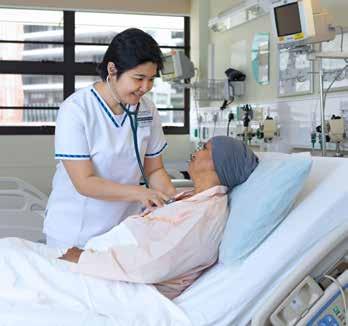
After graduating with a diploma in Biotechnology, Joanne Chong worked in a research lab for about 18 months. For one who acknowledges that she cannot sit still for too long, it is not surprising that she felt out of place in the lab. It was not until her diabetic grandmother fell unconscious from low blood sugar that she realised she really wanted to know how to take care of someone who needs medical help. She applied for nursing school soon after, and has never looked back.
She found her calling in critical care nursing, and has been part of the Rapid Response Team (RRT) at Singapore General Hospital (SGH) since 2018. The RRT can be activated anywhere in the hospital, and is designed to provide rapid assessment and intervention to acutely deteriorating patients outside of the ICU. The team will then assess if these patients need to be sent to the ICU.
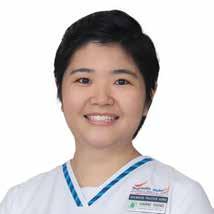
The RRT is led by Advanced Practice Nurses (APNs) and other medical professionals. As APNs have a sound working knowledge of all
the resources and personnel in the hospital, they can facilitate the prompt and appropriate care for the patient. Typically, the RRT is activated for patients experiencing difficulties in Airway, Breathing and/or Circulation, whereby the patient may have desaturated, have increased oxygen demand or experienced a drop in blood pressure. The RRT also responds to patients with altered mental status or metabolic derangements.
For Joanne, the non-routine nature of her work is a challenge she relishes. Other than honing her people skills, it has also taught her to be adaptable in handling different situations in a highly dynamic environment. “When you get to a ward, you have to know where to get what you need to get things done,” said Joanne, her eyes lighting up excitedly. “You must be able to do the assessment and think on your feet. I like this adrenaline rush. This was so different from being alone doing experiments in the lab,” she quipped.
Joanne was involved in training nurses on the use of Early Warning Score to pick up subtle signs of deterioration in patients. She was
ascertain whether a stroke patient is eligible for hyperacute stroke therapy. This treatment restores blood flow and reduces brain damage, offering patients the chance of a better recovery.
The time-sensitive nature of stroke treatment means that early intervention is critical. Leo Si Yan, who joined the hyperacute stroke nursing team at National Neuroscience Institute (NNI) two years ago, is painfully aware of this. Her grandfather had a major stroke and fell. He was not discovered till many hours later and, by the time he arrived at the hospital, it was too late. The incident made her determined to use her skills to help others avert such an outcome.
A stroke occurs when blood supply to the brain is interrupted by blood clots, fatty deposits in blood vessels or bleeding. This damages areas of the brain that control other parts of the body. Nurses like Si Yan quickly
As part of the CODE STROKE TEAM, Si Yan works with emergency physicians to assess stroke patients when they arrive at the Emergency Department of Tan Tock Seng Hospital (TTSH) to see if they are suitable for the time-sensitive treatment. With CODE STROKE nurses as first responders, stroke doctors only need to be activated once the stroke is confirmed and patients receive care faster, enabling them to achieve better clinical outcomes, noted Si Yan.
To recognise the significant impact of their work, the CODE STROKE TEAM won the SingHealth Nursing Awards 2022 Best Team Award for Nursing Excellence. “There are also plans for the National Nursing Academy to offer the nurse stroke responder training curriculum to all hospitals with hyperacute services,” shared Si Yan with pride.
With standards of stroke care constantly improving, Si Yan looks
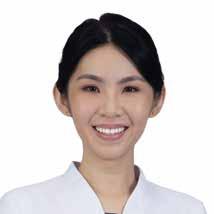
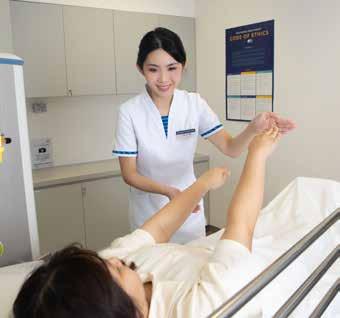
forward to sharing her knowledge with the ground nurses and educating the junior nurses so that they can detect stroke early and make a difference in the patients’ lives.
Seeing patients regain their independence because of the treatment brightens Si Yan’s day, but she and the team also face challenges, such as when there are no witnesses to the incident and the patient is unable to say what happened. In such cases, she cannot help but feel sad for the patient, knowing that the effects of the stroke could be irreversible when too much time has elapsed. That is why Si Yan is also keen to raise awareness about recognising stroke symptoms early by giving talks on the topic.
“I hope that everyone can help to educate the public, especially the elderly and those with cardiovascular risks, on the symptoms of stroke and the need for emergency care,” said Si Yan, who added that most cases of stroke can be prevented by maintaining healthy levels of blood pressure and cholesterol and by quitting smoking.
also involved in training nurses to set up high-flow oxygen therapy for patients in the ward. She professes to feeling like a proud mother when the nurses she has trained manage to independently set up high-flow oxygen therapy in the ward. Joanne hopes that more nurses can be trained to better manage patients with acute deterioration.
Always eager to enrich her mind and learn new skills, Joanne is already looking into learning data analytics so that she can put data collected to good use.
How to identify symptoms of stroke
• FACE – Facial droop. Uneven smile
• ARM – Arm numbness. Arm weakness
• SPEECH – Slurred speech. Difficulty speaking or understanding
• TIME – Call 995 and get to the hospital immediately!
Stroke is time-sensitive so act FAST. Do not wait!
You must be able to do the assessment and think on your feet. I like this adrenaline rush.
CHONG HUI LING JOANNE ADVANCED PRACTICE NURSE & ASSISTANT NURSE CLINICIAN SGH
I hope that everyone can help to educate the public, especially the elderly and those with cardiovascular risks, on the symptoms of stroke and the need for emergency care.
LEO SI YAN ADVANCED PRACTICE NURSE & SENIOR STAFF NURSE NNI
Thank you, dear Nurses, for your unwavering resolve and passion to always give of your best for our patients and their loved ones. You do everything with such grace and empathy. Every day, you make an immeasurable difference in our patients’ lives and inspire all of us in the SingHealth family. You are valued and appreciated more than words can express. You are truly the pride of SingHealth. Happy Nurses’ Day!”
Prof Ivy Ng Group CEO, SingHealth
You are irreplaceable members of the care team: innovators, researchers, educators, leaders — you are all these and more. We are touched each and every day by your passion, compassion, professionalism and deep sense of commitment. Thank you very much for being simply amazing! Have a wonderful Nurses’ Day!”
Prof Kenneth Kwek Deputy Group CEO (Innovation & Informatics), SingHealth; CEO, Singapore General HospitalNurses are often the eyes, ears, hands and brains in healthcare — the first to see and care for patients and a force for innovation and research to enhance care. Your fortitude and quiet strength help us overcome challenging times. I salute you for your utmost commitment, compassion and empathy towards our patients. Thank you, Nurses!”
Prof Terrance Chua Group Chairman, Medical Board, SingHealthEveryday IS Nurses’ Day. You are that critical force that delivers excellent care to our patients, irrespective of the appreciation by the patient or their relatives. Above the daily work, you dedicate additional time for education and innovation to improve the working conditions for the next generation. My deepest respect and salute to you for your dedication and commitment to your profession. Happy Nurses’ Day!”
Prof Teo Eng Kiong CEO, Sengkang General HospitalNurses, you are the heartbeat of SingHealth, the embodiment of care, comfort and compassion to our patients. Always resilient, agile and open to new opportunities, you truly inspire us with your contribution to academic medicine as educator, innovator and researcher.
Thank you and Happy Nurses’ Day!”
Assoc Prof Poon Choy Yoke
CEO, National Dental Centre Singapore
Nurses, thank you for your steadfast dedication and unwavering support. You are indeed pluripotent and able to take on new roles and challenges with such finesse!
Wonderful to have you in our healthcare and academic medicine teams. Your professionalism and resilience are remarkable. Here’s wishing you a Happy Nurses’ Day!”
Assoc Prof Au Wing Lok CEO, National Neuroscience Institute
‘Nurse’ is just another word to describe a person strong enough to tolerate everything and soft enough to understand everyone. We appreciate your strength, courage and tenacity tempered with warmth, kindness and grace. Happy Nurses’ Day.”
Prof Ng Wai Hoe Group CEO (Designate), SingHealth
A big ‘thank you’ to our nurses for your unwavering dedication and compassionate care. Your tireless effort, selflessness and expertise have made a profound difference in the lives of many. With hearts full of gratitude, we honour your noble work in healing, comforting and transforming lives. Nurses, you are truly the pride of SingHealth.”
Prof Lee Chien Earn Deputy Group CEO (Regional Health System), SingHealth
Deepest thanks to our nurses for your tenacity, compassion and dedication to make a lasting impact on the lives of patients. As the heartbeat of healthcare, nurses push the frontiers of care through research, education and innovation to give families the best start for a healthier future. You make such a great difference in all our lives. Happy Nurses’ Day!”
Prof Alex Sia CEO, KK Women’s and Children’s Hospital
Dear nurses, I salute your dedication and the selfless care and comfort you bring to our patients. The indelible impact, through the multiple roles you play, continues to inspire us and touch the lives of many. Thank you so much and Happy Nurses’ Day!”
Clin Assoc Prof Goh Bee Tin CEO (Designate), National Dental Centre Singapore
Heartfelt gratitude to all the nurses in SNEC and across the SingHealth cluster for your dedication and unwavering commitment to serving our patients with distinction. Your professionalism in caring for patients with sight-threatening or other health conditions is admirable. You make a difference to our patients’ lives daily. You are truly the pride of SNEC and SingHealth.”
Prof Aung Tin CEO, Singapore National Eye Centre
Nurses, our ever-present care angels, are champions of change, collaboration and new care models. Your dedication and versatility have brought great comfort to our patients and enhanced the culture of excellence in the health system. Every day that a happy patient is healed and discharged is testament to the great work of our nurses. Happy Nurses’ Day!”
Prof Fong Kok Yong
Deputy Group CEO (Medical & Clinical Services), SingHealth
A big ‘thank you’ to all our nurses for your care, support, dedication and hard work! The effort and sacrifice you make deserve the highest respect from us! You are our real heroes, and we salute you! Happy Nurses’ Day!”
Prof Lim Soon Thye
DeputyGroup
CEO(Research & Education), SingHealth
NURSE describes the many wonderful attributes of our nurses:
N – nurturing and noble;
U – understanding and undeterred when facing challenges;
R – resilient, reliable and resourceful;
S – sacrificially serving, with our patients always at the heart of all you do;
E – empathetic, engaging and endeavouring to improve patient care. Thank you for making so much of a difference to our patients. Happy Nurses’ Day!”
Clin Assoc Prof Ng Kee Chong
CEO (Designate), Changi General Hospital
Amidst a sea of changes and challenges in healthcare, our nurses are a steady force who always deliver care that matters to patients and caregivers in every healthcare setting, including in the community and at home. Thank you, Nurses, for your consistent and genuine care that has made a positive difference to so many lives! Happy Nurses’ Day!”
Prof William Hwang
CEO, National Cancer Centre Singapore
Our NHCS nurses are one of the greatest strengths in cardiac care. I remember how you showed kindness to me as to your patients when I was a medical officer, and we grew from colleagues to friends. During adversities, you remained steadfast in your dedication and care for our patients, and these qualities continue to inspire me. Happy Nurses’ Day!”
Assoc Prof Yeo Khung Keong
CEO, National Heart Centre Singapore
Our nurses are ordinary people who perform extraordinary work each and every day. You bring joy, warmth and comfort to our patients. You inspire us to be selfless, resilient, compassionate and better versions of ourselves. On this special day, I would like to wish everyone of you a Happy Nurses’ Day!”
Assoc Prof Gan Wee Hoe CEO, SingHealth Community Hospitals
To our amazing nurses, thank you for your selfless contributions and tireless dedication. Your compassion and care have gone a long way in bringing healing to patients. You are truly an inspiration to us! As we embark on Healthier SG, I am grateful to have such a committed team of nurses. Happy Nurses’ Day!”
Dr David Ng, CEO SingHealth Polyclinics
Assistant Director of Nursing Lee Ang Noi, Senior Nurse Manager Teo Kai Yunn and Nurse Clinician Wang Xia may be from different hospitals — KK Women’s and Children’s Hospital (KKH), Singapore General Hospital (SGH), and Changi General Hospital (CGH) respectively — but they are united in addressing a key issue: tracking assets more efficiently in their respective hospitals.
Every hospital manages a significant number of assets, ranging from medical equipment such as electrocardiograph machines (ECGs) to trolleys and infusion pumps used to deliver medications to patients intravenously. Sometimes, healthcare workers may struggle to locate required equipment and therefore must do frequent inventory checks. “It is labour-intensive to do manual inventory checks as nurses must spend time walking from one ward to another,” Ang Noi explained. “The time needed for this task could be better used caring for patients.” “This is also an issue that affects other colleagues such as our biomedical engineers, who manage some of these assets and conduct routine maintenance,” shared Wang Xia.
More importantly, the delivery of medicines could be affected during patient transfers. Elaborating, Kai Yunn said, “When a patient is transferred from one ward to another, the infusion pump is moved with them. Once the patient

arrives, the receiving ward nurses are required to set-up their own pump to continue the medication therapy. Switching to a new pump would mean an interruption to the delivery of the intravenous medication and nurses need to perform diligent checks to ensure the pump is set up correctly. As some medicines are sensitive to interruptions, the pumps need to be changed in the shortest time possible.”
To address this issue, Ang Noi, Kai Yunn, Wang Xia and a team of nurses from across SingHealth worked with
a vendor to develop an asset tracking system with a dashboard that tracks each piece of equipment in real-time, including its location and movement, the usability of the equipment, utilisation rates as well as the quantity available for use. These specifications took into account feedback and input from colleagues on the ground on what information would be useful and were incorporated into the finished product.
With the dashboard developed, the project team is now tackling the next technical hurdle. Kai Yunn explained that each piece of equipment needs to be tagged so that devices mounted on the ceiling can read its location. The difficulty arises when the equipment is placed too close to another zone. “For example, if available equipment is placed too near to a zone marked as ‘faulty’, the system may pick it up as faulty on the dashboard.” Kai Yunn and her team at SGH are now working with the vendor to improve the precision of the location reader.
Each hospital has also begun adapting its processes in preparation for the system to be rolled out at selected departments for testing. Preliminary feedback from staff has been positive, with many commenting how easy it was now to locate equipment.
The system offers other benefits. For instance, it eliminates the need for accompanying paperwork and management of loaned pumps between wards. It also removes the need to swop pumps when patients transfer wards, thus eliminating potential patient safety risks.
“This project was a collaboration between nursing and multiple other departments, including Biomedical Engineering, Department of Future
Health System, Integrated Health Information Systems and the SGH Emergency Medicine and Major Operating Theatres, where the project was first piloted,” said Kai Yunn. The eventual goal is to implement it across all SingHealth hospitals.
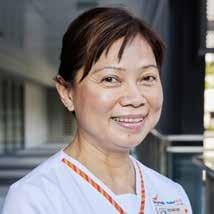
All three nurses believe in the need for such projects to continuously improve patient care and workflow efficiency. “Leveraging advances in technology, we can make meaningful improvements in care delivery for both nurses and patients,” said Wang Xia, who is currently pursuing a Fellowship in Nursing Transformation.
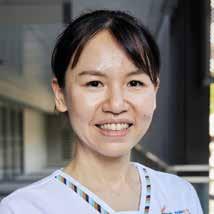
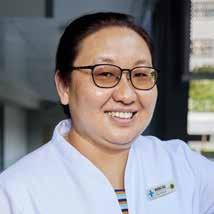
These nurses kick-started innovation and quality improvement projects to enhance patient care and workflow processes.
Elena Owyong
It is labour-intensive to do manual inventory checks as nurses must spend time walking from one ward to another. The time needed on this task could be better used caring for patients. LEE ANG NOI ASSISTANT DIRECTOR OF NURSING KKH
Leveraging advances in technology, we can make meaningful improvements in care delivery for both nurses and patients.
WANG XIA NURSE CLINICIAN CGH
This project was a collaboration between nursing and many other departments, including SGH Emergency Medicine and Major Operating Theatres.
TEO KAI YUNN SENIOR NURSE MANAGER SGH
Traditionally, patients rely on nurses for all aspects of their care during their hospital stay, including taking their medications. However, as patients are increasingly more knowledgeable of their own medical conditions and medications management, Assistant Nurse Clinician Sugeeta Ramadas and her team believe that patients can be empowered to manage their conditions. This starts with them taking
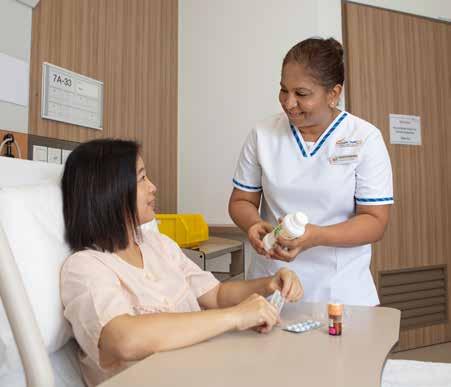
Inhaled therapy remains the mainstay treatment for patients with obstructive lung diseases. The effectiveness of medications is dependent on proper administration techniques. There are many different types of inhaler devices used in SKH such as pressurised metered dose inhalers (pMDIs), Ellipta and Respimat. Nurses therefore find it challenging to remember the different techniques used for each.
Assistant Nurse Clinician Toh Hsiao Peng, a respiratory specialty nurse, observed that nurses often spend time searching for a user guide for each type of inhaler. “They also struggle to demonstrate the correct way to use the inhaler,” Hsiao Peng shared. Improper use of the inhaler may result in poorly controlled symptoms and even frequent hospital readmissions.
To tackle this, Hsiao Peng and her team came up with The Art of Inhaler, a quality improvement project to make it easier for nurses to correctly administer the different types of inhalers available at SKH.
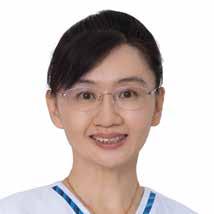
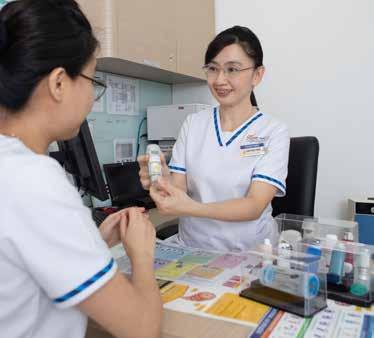
their medications independently and correctly during their short stay in the community hospital.
With that aim in mind, Sugeeta and her team from Outram Community Hospital (OCH), part of SingHealth Community Hospitals (SCH), embarked on a project called Self-Administration of Medications, or SAM for short. For a start, SAM targets patients who have undergone total knee replacement (TKR) surgery and encourages them to begin taking their medicines independently while they are still in the hospital.
“We chose to pilot this programme
with TKR patients because they are a group of patients who are generally independent in managing their activities of daily living. We do not want to remove that ability from them just because they are in a hospital,” Sugeeta explained. Empowering patients to manage their conditions and medications while they are in hospital will enable them to successfully and independently manage their own care when they transit home post-discharge.
Sugeeta and her multi-disciplinary team of doctors, nurses and pharmacists began working on this project in late 2022. As the nursing co-lead with Nurse Clinician Tan Pei Jie, she was involved in all aspects of the project, from initial
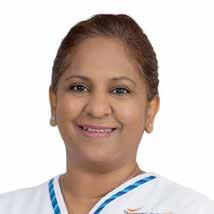
discussions to creating mindmaps to training the nurses on the new workflow. The programme also strengthens the patient’s medication knowledge at every step. The team first ensures that patients have sufficient knowledge about their medications before enrolling them into SAM. Nurses then continue to provide indirect supervision to ensure that patients on SAM can manage their medications well.
With the new workflow developed for doctors, pharmacists and nurses, the team began to trial it in May this year on selected patients. The goal is to gradually expand this initiative to more patients who are assessed to be suitable in the future.
Through a survey, they found out that nurses lacked confidence in teaching patients how to use the inhalers, especially because they did not have a reliable resource to guide them on administering the inhalers. As such, Hsiao Peng and her team worked to standardise inhaler administration techniques and design work instructions. They also created a series of videos and posters to guide nurses on how to use each type of inhaler. These posters were put up at all nursing stations for easy reference.
After developing these resources, one of the key challenges for the team was ensuring that everyone had access to the videos. So, Hsiao Peng turned to the nursing education team to incorporate the teachings in an e-learning module that nurses must complete as part of their competency checklist. Hsiao Peng’s team also conducts periodic audits to ensure that nurses are demonstrating the use of the inhalers correctly.
As a result, all the nurses surveyed reported feeling
more confident when teaching patients how to use the inhalers. Their knowledge scores also increased significantly, from four to 100 per cent. Additionally, the videos were so well received that even doctors and pharmacists used them to learn the correct techniques.
In the future, Hsiao Peng hopes to share the educational videos with other SingHealth institutions and adapt them into patient education materials.
Empowering patients to manage their conditions and medications while they are in hospital will enable them to successfully and independently manage their own care when they transit home post-discharge.
SUGEETA RAMADAS ASSISTANT NURSE CLINICIAN OCH
Improper use of the inhaler may result in poorly controlled symptoms and even frequent hospital readmissions.
TOH HSIAO PENG ASSISTANT NURSE CLINICIAN SKH
When Mdm Ting was diagnosed with breast cancer, she was worried that she could not cope with the treatment on her own. With the support of Senior Nurse Clinician Tay Beng Choo, she resolved to fight on.
 by Adaline Teo
by Adaline Teo
When Mdm Ting, 70, was undergoing chemotherapy treatment in 2020, she experienced nausea, vomiting, as well as cancer-related fatigue and insomnia. She was prone to falls and progressively became wheelchair-bound as she developed chemotherapy-induced peripheral neuropathy in her hands and feet. The pain and numbness were so severe that she would be in tears during treatment.
Being diabetic, the avid foodie could not even seek comfort in what she loved to eat on days when she was not struggling with nausea. To make matters worse, Mdm Ting lived on her own and struggled to manage household chores while keeping to her treatment schedule.
“In the beginning, even getting in and out of bed was difficult,” Mdm Ting shared. “Going for my treatments up to three times a week took its toll and I just felt angry and frustrated. I really felt that I did not want to live anymore.”
Noticing Mdm Ting’s struggles, her Medical Oncologist referred her to Senior Nurse Clinician Tay Beng Choo, a Supportive Care Nurse with the Accessible Cancer Care to Enable Support for Survivors (ACCESS) team at the National Cancer Centre Singapore (NCCS). The ACCESS programme aims to support patients through their cancer journey.
When Beng Choo and the ACCESS team learned about Mdm Ting’s complex medical history, which puts her at risk for treatment complications, social isolation and poor health literacy, she was referred to a number of support services, such as the cancer rehabilitation team, to better manage side effects of cancer treatment, including chemotherapy-induced peripheral neuropathy, cancer-related fatigue and insomnia.
To ensure adequate community support, Mdm Ting was linked up with an NCCS Medical Social Worker, Thye Hua Kwan Moral Home Help Services and the SingHealth community nursing team for follow-up. Beng Choo also encouraged
ACCESS is a Temasek Foundation-funded service programme designed to meet the supportive care needs of NCCS patients with breast and gynaecological cancers. Complementing the treatment efforts by oncologists, it systematically screens for needs and provides holistic support for patients and families within NCCS and into the community. This initiative has been shown to improve physical, social and psychological recovery in cancer patients.
Mdm Ting to text her if she had any questions or concerns. Whenever Mdm Ting came for treatment, Beng Choo made it a point to check how she was coping and assess her symptoms. Knowing that she was not alone motivated Mdm Ting to adopt a positive attitude and fight on. When she had difficulties with her appointments or treatment, she would approach either the community nurse or Beng Choo for assistance. Beyond patient care, Beng Choo supports Mdm Ting in other ways. When Mdm Ting’s mother passed away last year, Beng Choo supported her emotionally and checked on her from time to time. When she wanted to explore donating her whole body for research under the Medical (Therapy, Education and Research)
Act, Beng Choo sought advice from the National Organ Transplant Unit and put Mdm Ting in touch with a transplant coordinator. Mdm Ting has since completed her organ donation application and is at peace with her decision.
Beng Choo feels for patients like Mdm Ting and is inspired by their resolve and never-giveup attitude. “I can see a big difference in Mdm Ting’s mood from the first time I met her. Her distress screening used to score nine out of 10 compared to under five now,” shared Nurse Beng Choo. “She is tenacious and independent, so once she was given the resources and support, she made the effort to manage her condition.”
Dear Nurses,
As we emerge from the COVID-19 pandemic and continue to work under tough conditions, I am grateful for the sacrifices you make and the long hours you work to provide care and comfort to your patients and those in need.
With heartfelt appreciation, I thank each and every one of you for your unwavering dedication, compassion and support to your patients and healthcare. Your contributions and hard work are deeply valued and cherished.
As we celebrate Nurses’ Day, I hope you will take a moment to pat yourself on the shoulder and know that what you are doing is truly admirable and that you touch the lives of those you care for every day. May all the care and kindness you give to others come back to warm your heart. Happy Nurses’ Day!”
Paulin Koh Chief Nursing Officer, Ministry of Health
Dear Nurses,
As we look to the future of healthcare, we know that nurses will continue to play a crucial role in touching lives with new models of care and approaches to improving health. We are proud to venture into these unchartered waters with such a remarkable team. Your indomitable spirit and commitment to innovate and improve care is an inspiration to us all.
Your well-being is just as important as the care you provide to others. We are committed to supporting you in every way we can and providing the resources to help you thrive in your chosen career path. Thank you for always delivering your best. Wishing you a most Happy Nurses’ Day!
Adj Prof Tracy Carol Ayre
Group Chief Nurse, SingHealth
Ng Gaik NaiDeputy
Stephanie Teo Swee Hong
Group ChiefNurse, SingHealth; Chief Nurse, Singapore General Hospital
Png Gek Kheng
Chief Nurse, Changi General Hospital
Wong Sook Thow
Chief Nurse, KK Women’s and Children’s Hospital
Stephanie Yeap
Chief Nurse, SingHealth Community Hospitals
Adj Assoc Prof Ang Shin Yuh
Director, Nursing, National Dental Centre Singapore

Deputy Group Chief Nurse, SingHealth; Director, Community Nursing, SingHealth Office of Regional Health; Chief Nurse, SingHealth Polyclinics
Christina Lim
Chief Nurse, Sengkang General Hospital
Amy Tay
Chief Nurse, National Heart Centre Singapore
Lian Siew Bee
Director, Nursing, National Cancer Centre Singapore
Dr Ng Wai May Director, Nursing, National Neuroscience Institute

Dr Loh Huey Peng
Director, Nursing, Singapore National Eye Centre
nursing programme. “With Singapore implementing Healthier SG, our team now has a bigger role to play.”
Joanne was involved in developing a robust framework for the new service, collaborating with other SingHealth institutions such as KK Women’s and Children’s Hospital, National Dental Centre Singapore, and SingHealth Polyclinics to train and upskill the team in order to better meet the needs of women and children, as well as engaging community partners and social service agencies to strengthen the ecosystem of support, and raising awareness of the programme within the community.
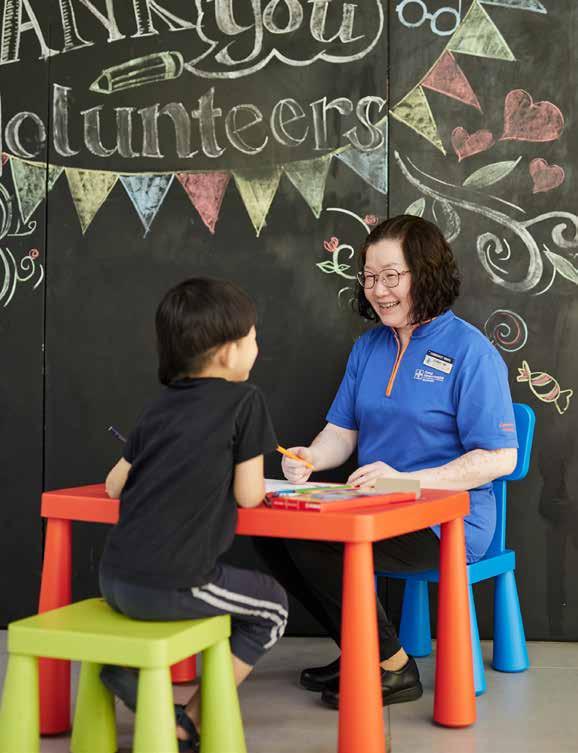
The programme’s focus has been on child health services, with nurses supporting mothers in the neighbourhood by monitoring developmental milestones and oral health for children up to six years old. Joanne shared an example of a mother who was concerned about her pre-schooler’s progress. “Through assessments to measure the child’s cognitive and motor skills, we were able to reassure the mother that her child was fine,” Joanne revealed. As for oral health, her nurses check for visible decay and cavities, and refer the child for further management if required. With positive feedback from parents, the team will expand their services to include preconception health and post-delivery care.
When Senior Enrolled Nurse
Norhafiszah Binte Abdul Latiff was in secondary school, she joined the Red Cross Cadets and volunteered at a nursing home, where she was inspired to pursue a career in nursing after witnessing the nurses there at work.


Norhafiszah has been a nurse for 14 years, the last five in SingHealth Polyclinics (SHP) – Sengkang, where the mother to a pair of eight-yearold twins performs diabetic foot and eye screenings. Some of her patients are as young as 23, a trend she finds worrying. Many of them have poor lifestyle practices, such as smoking and unhealthy diets. This is where she has decided to make a difference.
Senior Nurse Manager Joanne Yap Bee Eng began her work in community nursing in 2016 — she was part of the team that launched Changi General Hospital’s (CGH) Community Nursing Programme. Today, the veteran nurse with 28 years of experience leads 50 community nurses who are serving Singapore’s eastern districts such as Bedok, Tampines, Simei and Pasir Ris. With the expertise gained over the past seven years, Joanne and her team, alongside the SingHealth Office of Regional Health (SORH) and

Ministry of Social and Family Services (MSF), initiated a new programme to expand community nursing services to mothers and children living in the east. The Women’s and Children’s Health Services at Family Nexus was soft-launched in November 2022 at Our Tampines Hub. “Our goal is to provide support and early intervention through educational health talks and lifestyle counselling sessions, to help children develop good lifestyle habits and grow up healthily, paving the way for a better quality of life in their later years,” explained Joanne, who heads this two-year pilot community
Support for breastfeeding and the mental well-being of new mothers, particularly first-time mothers, is also in the plan. Joanne added that the programme aims to integrate health and social elements. “For example, we would like to partner pre-schools and educate the community on how they can better take care of themselves and their families,” she explained.
When asked what keeps her motivated, Joanne said, “Seeing my nurses grow from being novices to experts gives me a sense of achievement. When patients recognise nurses for the good work they do, that gives me joy.”
Norhafiszah is relentless in getting them to adopt healthier habits, such as following a well-balanced diet, reducing stress, quitting smoking and getting enough rest. “This prevents complications from diabetes,” she explained. She also urges them to exercise regularly, as leading a sedentary lifestyle contributes to the disease. “I tell them to start by walking at least 30 minutes a day,” she said. When patients who have followed her advice report that their blood sugar levels have dropped, she shares these ‘victories’ with other patients to keep them motivated.
Norhafiszah is an advocate of regular screening. She educates patients on the importance of early detection so that preventive action can be taken to avoid complications like heart and kidney diseases. “Empowering them with this information reassures me that the work I do truly makes a difference,” she shared.
Her station sees as many as 40 patients a day for foot screening. One challenge she faces is getting patients to use the right footwear. For diabetics, wearing closed shoes is vital to prevent injuries and cuts. “Some patients may not want to change the type of their footwear because they don’t find the shoes comfortable, or are reluctant to incur extra costs,” she said. But she remains committed to teaching patients how to select the right footwear.
She also administers eye screening tests for diabetic patients. “If they are in the clear, we advise them to repeat a screening once a year. If there are minor abnormalities, they should be screened every six months,” she added.
With diabetes being so prevalent in Singapore, Norhafiszah is proud to do her part to keep the disease under control. “When I see my patients get better from their treatment and appreciate the help I’ve given them, I feel deeply encouraged, and that motivates me to keep going in my job,” she said.
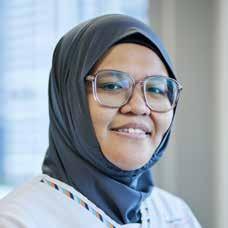
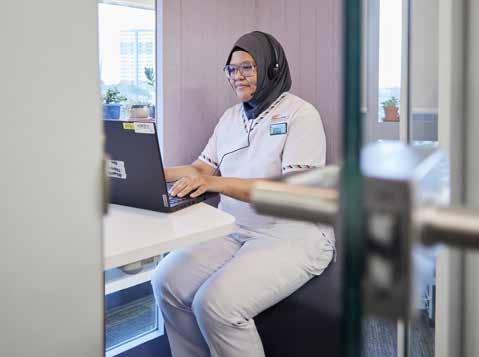
A community nurse for 13 years, Zhang Jin has attended to patients in unusual places, including HDB void decks and stairways, as patients sometimes request for care to be done outside their homes. This is par for the course for the native of Shanxi, northwestern China, who came to Singapore 20 years ago to be a nurse. “In a hospital setting, you have access to the necessary resources. As a community nurse, you work independently and must
be resourceful and think on your feet,” she shared.
Visiting different homes has enabled her to manage people
from different backgrounds. This has been useful in her current role as Nurse Clinician of Ageing Successfully in Place – Independent Rewarding Lives (ASPIRE), a community-based geriatric intervention pilot project, where she attends to patients aged 65 and above who are frail and require follow-ups by geriatricians. Patients who meet the above criteria are recruited for the programme at partnering clinics (General Practitioners or Polyclinics).
Zhang Jin then performs a comprehensive geriatric assessment of the patients’ functionality, fall risk, incontinence and nutrition status, and psychosocial needs. For ASPIRE, Zhang Jin is part of a multidisciplinary team comprising doctors, physiotherapists, occupational therapists, social workers, dietitians and community partners. Depending on the outcome of the patient’s assessment, she then refers the patient to the subject matter expert in the team for follow-up. Cognitive impaired patients, for example, are placed under the care of a geriatrician for further investigation, while those suffering from malnutrition will be referred to a dietitian.
Most people think that frailty is a normal part of ageing, but this is not so, stressed Zhang Jin. There are multiple contributing reasons that can be prevented with early interventions. She and her colleagues have attended to more than 270

patients since the programme began three years ago.
ASPIRE has been well-received. A daughter who accompanied her mother for the programme was so impressed that she referred her father to it. Another elderly couple who were due to be discharged from their physiotherapy sessions were keen to continue as the scheme is subsidised, with the first session being free and subsequent ones costing $10 each. However, to continue the rehab session, they had to be referred to a community partner, as patients are only allowed to be on the programme for a year.
According to Zhang Jin, her work as a community nurse has helped her grow professionally and personally. “Through regular case discussions in a multidisciplinary team, I have been able to expand my knowledge on caring for patients with certain conditions. As a person, I have also grown to be a lot more patient and appreciative of what I have,” she said.

A ward nurse in internal medicine since 2005, Nurse Clinician
Juweita Binte Arba’in ventured into community nursing in 2019 as she was passionate about providing care for patients beyond the hospital walls and empowering them to stay well. She spearheaded the new Hospital at Home model of care at Singapore General Hospital (SGH) in 2021 with a team of five community nurses. She now works with a private healthcare provider to ensure continuity of care at home after hours.
The programme aims to relieve bed capacity in SGH by supporting early discharge of patients who still require
hospital care but whose conditions can be safely managed at home. When COVID-19 hit, SGH@Home was converted into a COVID-19 virtual ward to support the early discharge of stable COVID-19 patients. Juweita worked closely with the Family Medicine and Continuing Care department to develop guidelines for this care model. “To date, we have enrolled more than 2,000 patients and saved more than 7,714 hospital beds,” said Juweita.
The project she is proudest of, however, is the Dr Buddy app, developed jointly by SingHealth and A*Star, for patients to monitor their vital signs while recovering at home. Juweita recalled how the team spent sleepless nights gathering information to design a viable platform within a short time. Now, patients report their vital signs via the app in less than five minutes, down from the 10 to 15 minutes that a nurse would have spent verifying the patient’s verbal report.
Another noteworthy project Juweita was involved in is the Hospital at Home (HAH) Buddy, which addresses the issue that community nurses often cannot find a suitable area in homes to perform their duties. HAH is a movable structure that provides space for storage, laying out items for nursing care procedures, and securing holders for items such as IV fluid bags, drains and urine drainage bags. The prototype has been tested in 10 homes and feedback has been positive.
Despite juggling work and family, Juweita is always available to her team’s needs. She was awarded the SGH Genuine Care Award 2022 in recognition of her empathetic leadership. “As the team leader, I try to keep everyone motivated and provide positive encouragement, especially because SGH@Home is a new care model. I feel honoured to receive this award,” said Juweita.
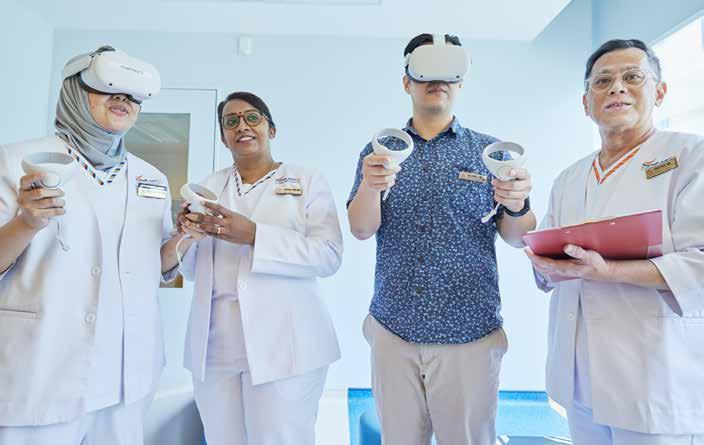
Having grown up in a family of educators, it is little wonder that Anuradha D/O Ramasamy, Nurse Educator at the Nursing Development Unit of the National Heart Centre Singapore (NHCS), has chosen to take a similar path.
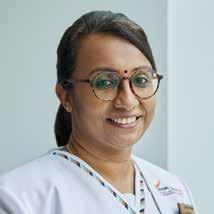
With 22 years of experience in nursing, including 10 as a nurse educator, Anuradha has seen her field evolve, especially during COVID-19, when technology replaced traditional teaching methods. “When the pandemic hit, we had to adapt swiftly and leverage online tools like Zoom to continue training. While we are in an endemic phase now, the experience has left us with broader perspectives on new teaching modalities to ensure that learning can always continue,” said Anuradha.
Apart from adopting technology in her teaching, Anuradha is also part of a team — consisting of four nurses and a multimedia specialist from NHCS — that is developing an educational tool for resuscitation training using virtual reality (VR).
This training programme equips nurses with critical resuscitation skills. The existing in-person training approach for nurses has certain challenges, including a constraint on the number of sessions due to the need for a physical setup, as well as the limited number of simulation
scenarios for nurses to practise. VR technology overcomes these limitations by enabling nurses to immerse themselves in customised, real-world scenarios that simulate critical situations. This not only provides them with an immersive learning experience, but also allows them to practise repeatedly without
having to wait for the physical setup of a training area. The virtual environment is designed to replicate real
clinical settings where nurses perform resuscitation with the same equipment and medications. Every learner will have the opportunity to interact with and utilise this equipment in a myriad of VR scenarios that are unmatched by traditional classroom training sessions.
“With VR, we can customise the scenarios to simulate highly realistic clinical situations and provide a safe learning environment for our learners. We are also able to assess their application of knowledge and skills learnt in different situations. For example, at level one, learners are required to assess and identify the early signs of patient deterioration and implement appropriate nursing interventions. Then, at level two, there are scenarios for when the patient actually crashes and requires resuscitation,” said Anuradha.
Anuradha and her team hope to create a training tool, to be used in tandem with the current hands-on life support training programmes, that not only engages nurses, but also enhances their learning. “We started the planning last year, and we’re hoping to pilot the programme in September this year,” shared Anuradha. “As we develop the game further, we hope to involve other hospitals in the future!”
When Chen Huiying decided to pursue a career in nursing, she thought she had to forego her childhood dream of becoming a teacher — until she found out about the role of a nurse educator. This position combines her interests in teaching and nursing, and is thus the perfect job for her!
In the years that followed, Huiying equipped herself with the necessary qualifications to become a clinical instructor, and thereafter attain her most recent promotion to Nurse Educator at Sengkang General Hospital (SKH).
The ward-based educator, with 10 years of nursing experience in critical care, developed a passion for technology-enhanced learning (TEL) during her own learning journey. Huiying took advantage of her tech knowledge, gleaned from various courses she had attended, to create interactive virtual classes and
When the pandemic hit, we had to adapt swiftly and leverage online tools like Zoom to continue training. While we are in an endemic phase now, the experience has left us with broader perspectives on new teaching modalities to ensure that learning can always continue.Anuradha (second from left) with the team developing the VR resuscitation training. ANURADHA D/O RAMASAMY NURSE EDUCATOR NHCS
e-learning modules that enhance her students’ learning journey. “I try to incorporate a number of technology tools in my teaching to make lessons more interactive and improve retention. I also look for software tools that allow me to develop e-learning courses on my own, and customise them as needed, without the need to source for a vendor,” shared Huiying.
For Huiying, TEL goes beyond creating a virtual classroom — it also means gamifying the learning experience with VR and augmented reality technologies. Together with innovations such as VR headsets and gloves that provide tactile feedback, nurse educators such as Huiying are now trying to create immersive simulations that allow nurses to practise their skills in realistic and engaging environments. “Previously,
simulation training was performed on mannequins, which took more man-hours as someone needs to observe while a nurse is being trained. With VR, we are able to consolidate learning, as these observations can be done virtually,” Huiying explained.

When asked about her perfect classroom, Huiying says it would be a smart classroom where students can attend either in-person or virtually, but can still meaningfully interact and share their learning and feedback through smart devices. However, she stresses that TEL does not replace real-life teaching. “Technology is meant to complement hands-on training. The human touch is always important,” she added.
At 20, Nur Dianah Binte Mohamed joined the National Heart Centre Singapore (NHCS) as a patient services assistant. Seven years later, she took the plunge and joined her colleagues in the wards as a nurse. Today, she is a Senior Enrolled Nurse in Ward 56 of NHCS, where she finds much fulfilment and meaning in her work.
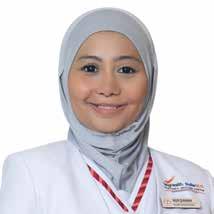
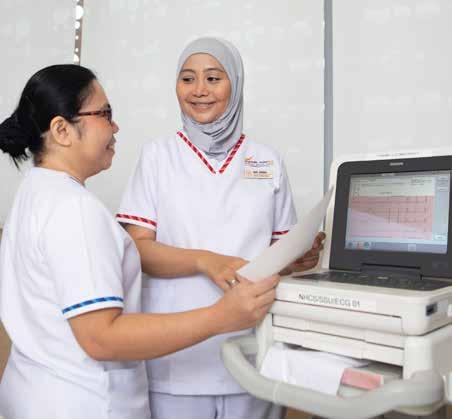
Nur Dianah’s path towards becoming a nurse was no walk in the park. As an administrative staff, she often admired her nursing colleagues as she watched them skillfully and confidently handle patients in the ward. This sparked off her interest to become a nurse and they encouraged her to pursue her nursing studies. Her big break came in 2007, when the director of nursing at NHCS told her of the

Previously, simulation training was performed on mannequins, which took more man-hours as someone needs to observe while a nurse is being trained. With VR, we are able to consolidate learning, as these observations can be done virtually.
CHEN HUIYING NURSE EDUCATOR SKHHuiying is working on transforming interactions with mannequins into a VR experience.
Nursing as a career is laudable but challenging. These nurses share their career milestones, and the help and encouragement they have received on the journey.
by Fiona Chen
I am fortunate to have a supportive family and helpful colleagues who guided me whenever I had questions related to my studies.
NUR DIANAH BINTE MOHAMED SENIOR ENROLLED NURSE NHCS
Career Conversion Programme for Enrolled Nurses, funded by Workforce Singapore, Ministry of Health and NHCS. Elated that she could finally fulfil her ambitions, she promptly enrolled and graduated 18 months later.
“It was not easy when I was studying to become a nurse. As I came from an administrative background, I did not have the same basic clinical knowledge as some of my classmates who had worked in the wards. I am fortunate to have a supportive family and helpful colleagues who guided me whenever I had questions related to my studies,” shared Nur Dianah.
It has been more than a decade since she became a nurse, and Nur Dianah is now paying forward the kindness of her colleagues by helping new nurses to come on board in her team. “I always reassure new nurses and share my knowledge with them. Some things just can’t be learned from books!”
Neo Siew Hoon, Senior Staff Nurse at the National Dental Centre of Singapore (NDCS), has been a nurse for more than two decades, honing her skills across a breadth of specialties.
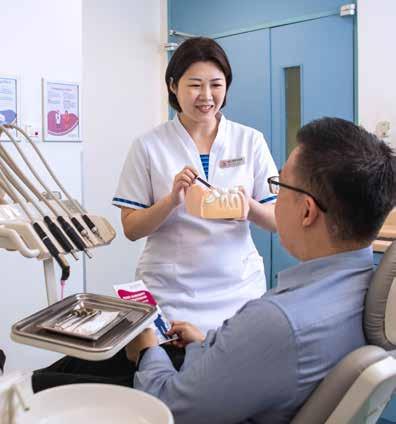

Right from her first posting at the Emergency Department of Singapore General Hospital (SGH), she was impressed by the ever-evolving field of medicine. “As new technology, therapeutics and care pathways emerge, nurses must also keep learning to ensure we deliver the best care for our patients,” said Siew Hoon. This mindset of continuous learning remains a constant in her career.
During a stint at Singapore National Eye Centre (SNEC), she was sponsored to pursue an Advance Diploma in Nursing (Perioperative). Beyond academic progress, the course also presented the opportunity to be attached to other hospitals and experience how they carried out surgeries. Recounting a particularly memorable day when she was tasked to assist a surgeon one-on-one with caesarean surgeries, Siew Hoon shared that she helped deliver five babies that day. “I consider this to be one of my biggest achievements,” she recalled fondly.
In 2012, Siew Hoon ventured into a new specialty, joining an Ear, Nose and Throat Clinic. As part of her learning, she had the opportunity to fly to the United States of America to attend a short course on Allergy and Immunology conducted by the American Academy of Otolaryngic Allergy. “It was a very fulfilling trip as I learnt from many experts and made new friends there,” she shared.
Since 2018, graduates like Rajesh joining SingHealth Nursing will benefit from the Graduate Nurse Integrated Programme (GNIP) in the first year of their professional practice. As the first year of nursing is known to be especially challenging, the GNIP aims to provide guidance and support for new nurses in three phases over the course of a year, beginning with an orientation programme and leading into a clinical preceptorship. Over 800 nurses have benefited from the GNIP so far, with another 294 currently in the programme.
As a combat medic during his National Service, Rajendran Rajesh was inspired to be a nurse by his unit’s medical officer, who suggested that he take up a career in nursing when he saw the parallels between Rajesh’s work and that of nurses in a clinical setting.
Fast forward to the present and the seeds that Rajesh’s medical officer planted in his young mind have come to fruition: he is a Ministry of Health Holdings’ Integrated Nursing Scholarship recipient,

and has just graduated at the top of his cohort at Nanyang Polytechnic. This achievement means he now has the chance to pursue a nursing degree at the prestigious King’s College London.
As Rajesh has chosen to serve his bond with NHCS, he also wishes to build a strong foundation in cardiovascular medicine and nursing research, an interest that grew when he was paired with his NHCS research mentor, Staff Nurse Eugene Wee, during his attachment as part of the SingHealth Nursing Student Mentoring And ReTention (SMART) programme. “My main goal is to make an impact in the nursing community, to be able to innovate further or even discover something new,” he added.
Even though he has yet to officially kickstart his nursing career, Rajesh has already given back to the community by being the chairperson of Trailblazers, the SingHealth Nursing Students’ Council formed in 2019 by SingHealth-sponsored nursing students from the various SingHealth institutions.
While Siew Hoon’s learning journey is an ongoing one, her career has almost come full circle, with her contributing knowledge not only as a preceptor to new nurses but also on a much larger scale: she is involved in the planning of a new building slated to open in 2027 that houses SGH’s Elective Care Centre and NDCS. She and her committee members plan for the furniture, fixtures and equipment needed for daily operations at the dental surgical suites in the new building. When asked about the motivation behind her nursing career, she simply replied, “I’m happy to do my part to improve the lives of patients!”
“Trailblazers serves as a conduit between SingHealthsponsored nursing students and nursing leaders, giving students a voice and an opportunity to shape their nursing journey at SingHealth,” said Rajesh. Trailblazers also helps with events such as the SingHealth Open House, where members interact and share their experiences with prospective nurses and field common questions. Once his term as the chair of Trailblazers comes to an end in May 2024, Rajesh hopes to continue his support by mentoring the next batch of the council’s executive committee.
As new technology, therapeutics and care pathways emerge, nurses must also keep learning to ensure we deliver the best care for our patients.NEO SIEW HOON SENIOR STAFF
NURSENDCS RAJENDRAN RAJESH MOHH INTEGRATED NURSING SCHOLARSHIP RECIPIENT
My main goal is to make an impact in the nursing community, to be able to innovate further or even discover something new.
Behind every successful surgery is a dedicated team that makes sure everything goes smoothly. At the Theatre Sterile Supply Unit (TSSU) of the Singapore National Eye Centre (SNEC), Saraswathi oversees the decontamination and sterilisation of sets and instruments used in surgery. For her, every step in this process is important. Ensuring that the instruments are free from defects and breakages keeps patients safe. Overseeing the sterilisation process maintains quality assurance. Being on top of things enables her to meet special and urgent requests when they arise.
SENIOR PATIENT CARE ASSISTANT EMERGENCY DEPARTMENT CGHA love for working with people and curiosity about medicine led Ong Ah See to a lifelong career in healthcare. Having decided at a younger age that she was not academically inclined, she opted for a supporting role and is now a Senior Patient Care Assistant (PCA) at Changi General Hospital’s (CGH) Emergency Department (ED).
The 59-year-old mother of four grown children thrives on helping people, from assisting patients undergoing electrocardiographs (ECGs) to being a Mandarin translator for non-Mandarin-speaking doctors. Conducting her duties in the fast-paced environment of the ED keeps her busy and fulfilled. “Once I get to work, I will get busy helping here and there, and before I know it, the shift has ended,” shared Ah See.
Naturally, tensions can run high in the ED, such as when anxiety grips patients or their next-of-kin. This is when the support of the healthcare team, especially her Nurse Manager, keeps her going. Describing the ED team as a close-knit family, Ah See said, “We understand each other well and we comfort one another when we have had a bad day. I also focus on things that make me happy, such as planning to cook for my family and colleagues. At the end of the day, when patients walk out of the ED feeling much better, it makes my day.”
There is joy in working in a positive environment, and Ah See likes that she can nurture her passion for learning at her workplace. Whenever she gets the chance, she asks doctors to explain medical terms, medication or even procedures, so that she has a better understanding of what is going on and can step up to help.
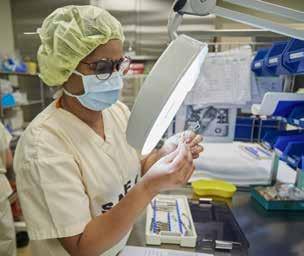
The cheerful lady also enjoys travelling, playing badminton and singing. Her dedication and approach to having a great work-life balance could be the secret to her winning several awards at work, including the Singapore Health Quality Service Award!
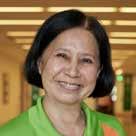
Before joining SNEC as an Operating Theatre Assistant, Saraswathi worked for an ophthalmic surgeon in India. When she joined the TSSU, she had to learn every step of the decontamination and sterilisation process, with support from a preceptor. Today, Saraswathi is herself a preceptor paying it forward by sharing her knowledge and experience with new staff during their clinical attachment in TSSU.
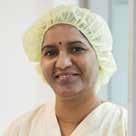
Attending to patients’ activities of daily living was a 180-degree change from her previous job. Dealing with the body waste of bedridden patients was one thing, but encountering patients who spewed vulgarities at her was demoralising.
Encouraged by her ward supervisor, Gek Luang pressed on, but the real turning point came when she received a ‘thank you’ card from the family of a patient. The patient’s will to live was strong despite his terminal illness, and this inspired Gek Luang to not give up. Journeying with this cancer patient made her realise she had a meaningful role to play.
As a Patient Experience Associate at SingHealth Community Hospitals (SCH), Gek Luang assists the healthcare team in providing basic caregiving activities to patients to ensure their comfort and safety, and improve their hospital experience. Her cheerful personality evokes a sense of warmth as she goes about helping patients. The 64-year-old is also proficient in various dialects, allowing her to bridge communication gaps between elderly patients and their healthcare team, who may not be proficient in local dialects or languages.
Gek Luang is quick to add that interacting with patients from diverse backgrounds has given her a fresh perspective on life. She recalled an incident when a patient suddenly removed her catheter, causing urine to splash everywhere. Rather than getting angry and jumping to the conclusion that the patient did it on purpose, Gek Luang found herself empathising with the patient’s frustration, and was able to calmly communicate with the patient and gain her cooperation eventually. “I’ve learnt a lot from being with my patients, to appreciate small things in life and let unimportant things go,” Gek Luang shared. “Being able to experience patients’ life journey and creating memorable moments with them keeps me motivated to continue in this line of work.”
For the 50-year-old mother of two, choosing a career in healthcare was a winning move. Not only has it given her opportunities to learn and develop professionally, it has also allowed her to make a positive impact on the lives of patients and their families.
What matters most to Saraswathi is having team members who are supportive and open-minded. “Having a supportive team at work means we often help one another to complete daily tasks and overcome challenges. Together, we take pride in providing good-quality service for our surgeons and, ultimately, our patients,” said Saraswathi.
When Chia Gek Luang was retrenched from her job at a printing company 20 years ago, she enrolled in a Patient Care Assistant course with NTUC and embarked on a new career. However, she almost called it quits after two months on the job.
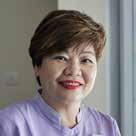
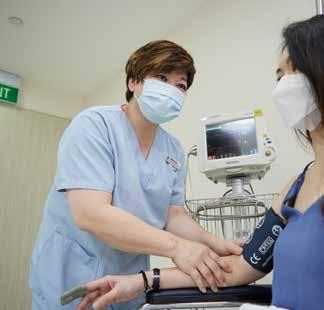
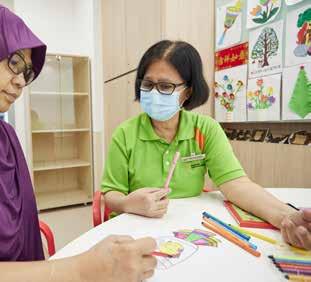
Working alongside nurses, our nursing support staff form an integral part of the patient care team — attending to the details that matter in the delivery of quality healthcare.
“Oncology nurses often develop strong bonds with patients and their families while journeying with them through a difficult time in their lives. Knowing you are making a difference is very fulfilling,” shared Gemma D Peralta, Nurse Clinician, National Cancer Centre Singapore (NCCS). “Oncology is complex, requiring a deep understanding of cancer biology, treatment options and palliative care, making it an engaging career,” she added.
Gemma oversees the daily operations of the Ambulatory Treatment Unit at NCCS, where she works closely with the senior nurse manager to develop care plans for patients. She came to Singapore from the Philippines to work as a Patient Care Assistant at NCCS in 1999. Since then, Gemma has risen through the ranks, eventually becoming a Nurse Clinician. She is grateful to NCCS
and the nursing department for recognising her potential and for sponsoring her Advanced Diploma in Nursing (Oncology) and Bachelor of Nursing programmes.
“Nurses in Singapore have access to a wide range of professional development opportunities to enhance their nursing skills. We also have the opportunity to work closely with a
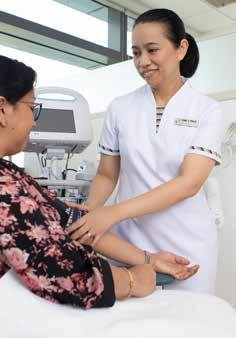
multidisciplinary team of physicians and other healthcare professionals to deliver high-quality care to patients,” she said.
Gemma credits Singapore’s high standard of healthcare, access to advanced medical techniques and technology, excellent working conditions and career advancement opportunities as factors that motivated her to work in SingHealth for more than two decades. Most of all, she feels that she has found a place to call home, a fulfilling career and supportive team at NCCS.
“My ancestral family members and neighbours have a close connection to Singapore, and appreciate the country’s cultural diversity and inclusivity,” said Chandra Sekaran Pethaperumal. The Nurse Clinician works in the Children’s Intensive Care Unit (CICU) of KK Women’s and Children’s Hospital (KKH), a unit he has been with since his arrival in
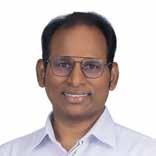
Singapore in 2000 as an Enrolled Nurse. He became a Nurse Clinician in 2013.
At the CICU, extracorporeal membrane oxygenation (ECMO) is vital for critically ill children with severe cardio-respiratory failure. Chandra trains nurses in the use of ECMO and ECMO simulation. He also manages the ward and collaborates with the healthcare team in patient care delivery, planning and evaluating the work process of services rendered to patients. He is actively involved in the clinical management and decision-making processes in delivering safe patient care.
While acknowledging that caring for sick children can be challenging, Chandra feels that he can play an active role in supporting the children and their distressed parents. “As a nurse, I feel that kind words and attending to the needs of patients and their families can make a difficult time more bearable. This gives me the most satisfaction,” he shared.
Over the years, Chandra’s passion for nursing has been recognised, having received awards such as the National Day Award – Efficiency Medal for Nursing, the D.S. Lee Foundation Award for Nursing Excellence and the KKH Best Outstanding Preceptor in Nursing (Clinical Teaching) award, among many others.
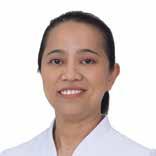
He believes that it takes three ‘C’s to be a good nurse: compassion, commitment and competence. That is why he continually upgrades his skills through professional courses. More recently, he completed a MOHsponsored Master of Science (Health Practice) in Clinical Leadership at Curtin University Singapore.
Chandra hopes to continue contributing to the healthcare sector. Hence, he is working on a project studying burnout and resilience among paediatric nurses at KKH. “Burnout among nurses is a real challenge. Through this study, we aim to provide a foundation for future initiatives to improve resilience and reduce burnout among paediatric nurses in Singapore,” he shared.
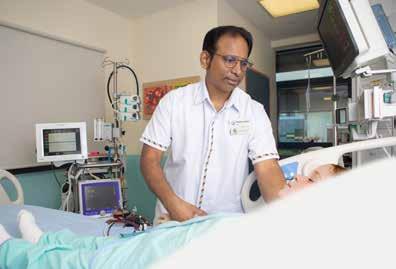
Guo Yan was hospitalised for a long time when she was nine years old. She was terrified of daily injections and being alone in the hospital, but a nurse allayed her fears. Since then, she has regarded nurses as angels who can make a difference in someone’s life, and was inspired to become one.
Now, Guo Yan works as a nurse clinician at the Singapore National Eye Centre’s (SNEC) operating theatre, where she supervises and ensures the smooth operation of the daily elective and emergency surgeries. She also conducts staff training and assesses their core competencies, in addition to other duties.
Guo Yan derives a strong sense of purpose in her role as a perioperative nurse. “Being part of the surgical team that helps patients regain their sight has given me fulfilment and empowerment,” she said. This sense of fulfilment has encouraged her to continue working at SNEC for over 20 years. A Chinese national who came to Singapore in 1998 as an observer, she decided to join SNEC in 2000 as a Registered Nurse after developing a keen interest in providing perioperative care for patients.
While Guo Yan enjoys her work at SNEC, she struggled with the language barrier when she first arrived in Singapore, and could not understand patients speaking Chinese dialects and other languages such as Malay. To overcome this, she learnt basic phrases to better communicate with her patients. She also felt homesick as she did not have any family members in Singapore. “I managed to overcome this with support from my colleagues and supervisors,” she added.
Guo Yan feels that there are plenty of advantages to being a nurse in Singapore, such as a clear career pathway and good peer and supervisory support. She is appreciative that her dedication and passion is recognised here, which led to the sponsorship of her further studies. In 2010, she completed an advanced diploma in perioperative
The career advancement opportunities I have received have well-rooted me as an Oncology Nurse at NCCS. Now, with my young family of three, I hope to strengthen those roots in Singapore, our home away from home.
My wish is for nurses to be more actively involved in clinical management and decision-making processes while providing compassionate and quality care for patients and their caregivers.CHANDRA SEKARAN PETHAPERUMAL NURSE CLINICIAN KKH GEMMA D PERALTA NURSE CLINICIAN NCCS
nursing at Nanyang Polytechnic. She also took clinical teaching courses at the SingHealth Alice Lee Institute of Advanced Nursing in 2014 and completed a Bachelor of Science with distinction in Nursing from Edinburgh Napier University in 2016.
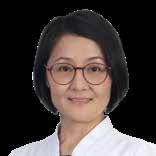

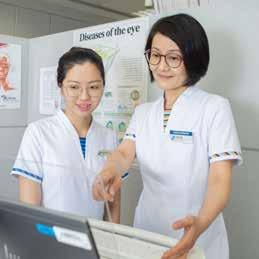
The little things count
Myanmar-born Saw Gay Blu Thaung always wanted a career where he could make a difference. When the opportunity to pursue a nursing career in Singapore arose in 2003, he took it right away as he believed Singapore offers great training to kick-start a career in nursing.
Starting out as a nursing aide at Bright Vision Community Hospital (BVCH), Blu Thaung quickly acquired a passion for palliative care, which was his first encounter as a healthcare professional. “My experience in the palliative ward inspired me to continue my nursing journey. Even though the patients may not be able to express their thanks verbally, I could see from their actions and their eyes that they are appreciative of all that we do for them. I am glad to be able to bring comfort to them during their last days,” he shared.
Blu Thaung has come a long way since. In 2007, he was promoted to Enrolled Nurse and worked at the Hospital’s rehabilitation ward for a year before transferring to the chronic sick ward, picking up skills and expertise
Volunteering has been a part of Anthony Chandren’s life for as long as he can remember.
Chandren first started helping Hindu temple priests when he was 18. “I started volunteering even before I started nursing,” said Chandren, who has been working as a nurse at Singapore General Hospital’s (SGH) Emergency Department (ED) for the past 34 years.
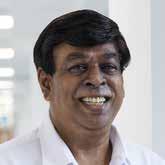
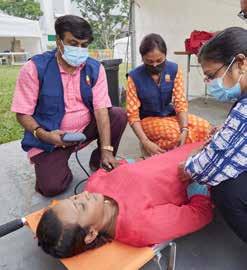
that paved the way to his current role at Outram Community Hospital (OCH), which, like BVCH, is part of SingHealth Community Hospitals (SCH). Now a Senior Enrolled Nurse at OCH’s ward 8C, a dedicated ward for patients with dementia, Blu Thaung is able to put his compassion and expertise towards helping patients with activities of daily living and mobility.
What Blu Thaung enjoys most about his job is conducting activities — simple exercises, bingo, colouring, drawing — to keep his patients engaged. “Despite their dementia, they look forward to the activities. Seeing their enthusiasm encourages me to do my best for them.”
Being a nurse has its fair share of challenges. “The hardest thing about being a nurse is handling extremely high levels of stress. You must deal daily with life and death, communication barriers, high demands of patients and complaints. I overcome them by attending training and language classes. Singapore and SCH offer many development opportunities,” said Blu Thaung. He credits his peers and patients for motivating him. “That sense of satisfaction when I see my patients’ conditions improve, from admission to discharge, is a feeling I will always cherish.”
His contributions have been recognised with him receiving the prestigious Tan Chin Tuan Nursing Award in 2013 and the Singapore Health Quality Service Awards in 2014.

When patients arrive at the ED, Chandren and a team of nurses determine the severity of their symptoms at the triage point so that the more serious cases are attended to immediately. He performs nursing procedures, administers medication and also assists doctors with various medical procedures at the ED.
On his days off, Chandren volunteers with the medical support service of the Hindu Endowments Board (HEB). The service, which he started with a few other volunteers in 1993, prepares and attends to medical emergencies at all major events. It also organises a largescale Health Fair, which provides free medical screening, medical counselling and a medical forum to educate the public on various medical conditions.
At the ED, Chandren handles patients across a wide range of disciplines. This clinical experience and training has proven to be invaluable to the medical support service as he is responsible for planning and preparing the medical bags and other logistics for the medical support team at major Hindu festivals such as Thaipusam and Firewalking organised by the HEB. Beyond that, he has also grown a volunteer network of over 235 nurses and 12 doctors from various healthcare institutions in Singapore whom he can tap on to help at these events.
Of the many people that he has attended to over the decades as a volunteer at the HEB, Chandren vividly remembers a patient he helped in 2019. “One of the devotees slipped and fell on the fire pit while firewalking and 60% of his body was badly burnt,” Chandren recounted. This was the worst case he had encountered; most casualties suffer from minor burns on their soles while firewalking. Thanks to Chandren’s training as a nurse, he was able to treat the devotee promptly before the devotee was sent to the hospital via the ambulance on standby. “I was very happy we saved him. Once he recovered, he came to the temple to thank us,” Chandren shared.
For his contributions to the HEB, Chandren has been recognised with a Commendation Award, an Achievement Award and an Excellence Award. The Commendation and Achievement Awards were given to him for serving as a volunteer for five and 10 years respectively, while the Excellence Award was for his exemplary and long service as a volunteer.
I am grateful to work and learn in a specialised dementia care ward. My interactions with my patients affirmed my choice to become a nurse.
Being part of the surgical team that helps patients regain their sight has given me fulfilment and empowerment.
GUO YAN NURSE CLINICIAN SNEC
I’m proud to be saving lives, not just in the Emergency Department but also by volunteering in my community.
Dinah almost embarked on a professional football career but decided to become a nurse instead. The former national player still enjoys a kickabout weekly, while competing in inter-club events and the Women’s National League.
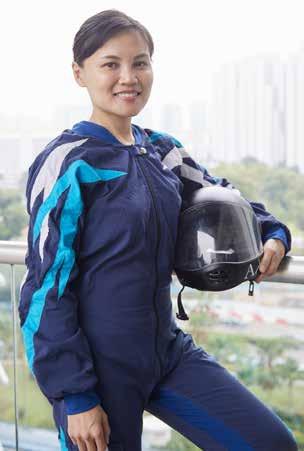



Lilian enjoys playing the violin, a hobby she picked up when she was 14. Mastering the violin required a lot of time and patience, and honing this skill has strengthened her discipline and resilience.
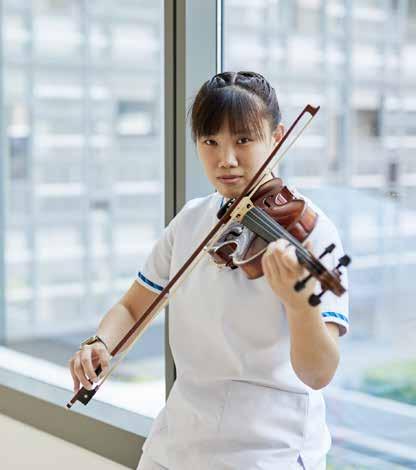
Olivine has skydived in New Zealand and trekked to the Everest base camp — experiences that she says challenged her to step out of her comfort zone and fuel her desire to live life to the full.
Ci En is part of a lion dance troupe, an activity she took up when she was a polytechnic student. Ci En, who plays the drums, describes lion dance as a beautiful art form, where every team member has a part to play in the lion’s movements, incorporating teamwork, coordination, communication and trust to ensure a smooth performance.
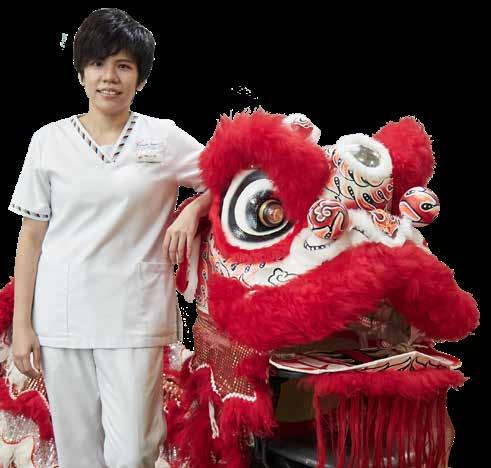
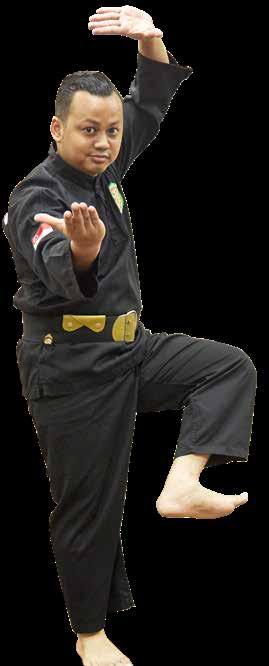
Muhsin has been practising silat since he was seven. Today, not only is he a black belt holder in his silat club, he also has several accolades to his name, including winning numerous competitions and being a team manager of the Singapore Silat National Team that won the 2016 Rembau (Malaysia) Open Championship.
Even though it is only a hobby, Pal Mae’s art has touched lives. When she teaches her patients how to draw, it allows them to express their feelings through their artwork, which in turn lifts their spirits. Pal Mae discovered her talent for drawing when she was in primary school. It is an interest she has honed through regular practise and trying out of different techniques. She enjoys drawing objects of nature as it has a calming effect on her.
PNG CI EN, NURSE MANAGER, SINGHEALTH POLYCLINICS — TAMPINES DINAH SAJIDAH BINTE IMRAN, ENROLLED NURSE, SINGAPORE NATIONAL EYE CENTRE MUHSIN BIN MANSOR, SENIOR STAFF NURSE (COMMUNITY NURSE), SINGAPORE GENERAL HOSPITAL PAL MAE SANDOVAL PANGILINAN, STAFF NURSE, SENGKANG COMMUNITY HOSPITAL, SINGHEALTH COMMUNITY HOSPITALS LIM WAI YAN LILIAN, SENIOR STAFF NURSE, SENGKANG GENERAL HOSPITAL TAN TING JIA OLIVINE, ADVANCED PRACTICE NURSE & NURSE CLINICIAN, KK WOMEN’S AND CHILDREN’S HOSPITAL